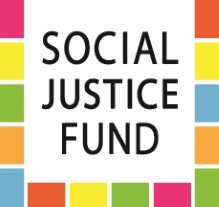ソーシャル・ジャスティス基金(SJF)第6回助成
モザンビーク開発を考える市民の会=SJF助成事業中間報告(2018年6月)
◆団体概要:
2012年12月にアフリカ・モザンビーク・農村開発に関わる研究者・NGO・市民によって設立。日本がアフリカの最重要国として位置づけるモザンビークに行う投資・開発援助が、同国の圧倒的多数を占める小農のみなさんが望む発展に繋がるように、小農主体の調査研究・政策提言・アドボカシー活動を行ってきた。span>
◆助成事業名:『援助・投資によるインジャスティス(不正義/不公正)を乗り越える〜3カ国市民社会連携を通じたアドボカシー活動 』
本事業は、以下の5点を目標・目的として立ち上げられた。
(A)立ち上がった小農を支えることを最上位目標とする。
これを実現するため、
(B)現地のCSOsと共に、活動をより効果的なものに育て、
(C)これまでの経験や知見を3カ国社会と世界に還元することで、
(D)より公正で民主的な社会・世界づくりに寄与する。
そのため、
(E) 国連「ビジネスと人権の指導原則」や国連人権理事会「小農の権利宣言」に向けた努力に合流し、活動をより上のレベルに繋げる。
◆事業計画 :
以上の目標・目的を達成するため、具体的には、次の6点の活動を計画した。
(a) 小農運動支援:異議申立プロセスの支援、運動のキャパシティ向上支援、その他、小農運動が求める支援を進める。
(b) 共同調査:現地小農運動・CSOsと日本のNGO・研究者で、日伯開発計画・投資のナカラ回廊沿いへの影響を調査する。
(c) 政策転換のための対話:3カ国市民社会として、共同・個別に各政府・企業との対話や政策提言を行う。日本では、外務省・財務省・JICA・JBICと進出企業との対話を重視する。JICAの「環境社会配慮ガイドライン」の改定に知見を活かす。
(d) 市民社会連携の強化・発信:
(e) 国連「小農の権利宣言」の採択/国連「ビジネスと人権に関する指導原則」
(f) 3カ国市民社会会議@東京
これらを踏まえ、以下の年間計画を設定した。
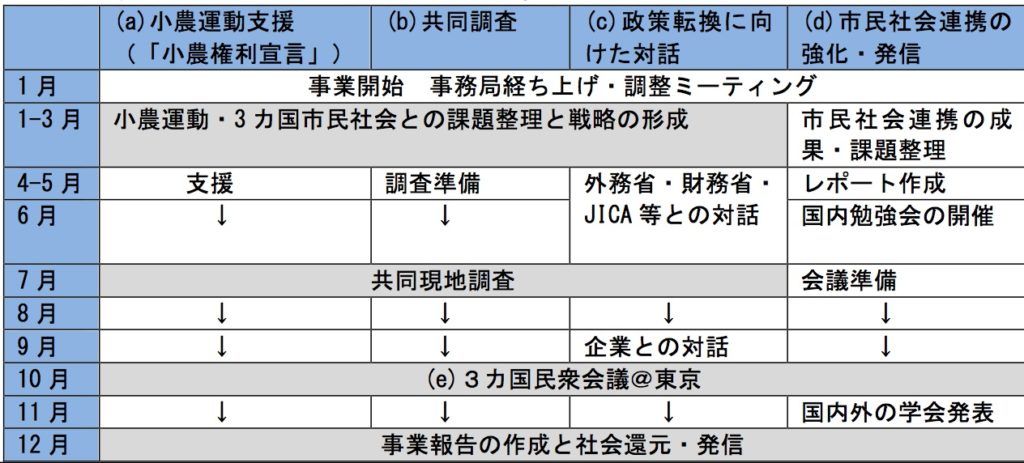
※(b)の共同調査の参加者に対するモザンビーク政府のビザ不発給状態が続いたことを受けて(10月〜)、現地小農運動とCSOだけの調査となった。
◆助成金額 : 100万円
◆助成事業期間 : 2018年1月~2018年12月
◆実施した事業と内容: 以上の計画を踏まえ、2018年1月から6月までの間に、上記の具体的活動について、次のように実施してきた。
(a) 小農運動支援:
- 異議申立プロセスの支援:「意見書」の日本語訳を作成し、JICAに提出。
- 運動のキャパシティ向上支援
- 河野大臣宛書簡、JICA理事長宛書簡、声明(2点)を翻訳し、ファックスし、対応を呼びかけた。4月29日から5月7日まで、現地小農運動・CSOが、日本の官民が進めるナカラ経済回廊開発(特に、内陸部と港を結ぶナカラ鉄道)の影響を調査した。
(b) 共同調査:
4月29日から5月7日まで、現地小農運動・CSOが、日本の官民が進めるナカラ経済回廊開発(特に、内陸部と港を結ぶナカラ鉄道)の影響を調査した。
(c) 政策転換のための対話:
- プロサバンナ事業:
- 外務省・JICAへの情報照会を継続
- NGO外務省定期協議会・ODA政策協議会(3月1日)に議題提出し、その後のフォローアップを実施
- これまでの活動を踏まえ、河野太郎外務大臣による「指示」内容が伝達され、これに関するフォローアップ作業(詳細の確認)と議事録の公開、現地の小農運動やCSOsへの伝達を行った。
- 議員主催の勉強会(4月23日)に出席し、外務省・JICA・議員に資料を提供するとともに、現地の状況を踏まえた議論を行った
2. ナカラ回廊開発:
- 2015年から継続する財務省・NGO定期協議会での議題提出・問題提起のフォローアップとして、次の活動を行った
イ)民間企業(三井物産)からの情報提供の要請を融資元であるJBICを通じて行った。
ロ) 三井物産からは契約書への調印が求められたことを受けて、JBICを通じての情報開示を要請し、3度の面談を経て、次を実施した。
- 4月11日の個別面談では、過去の現地調査で明らかになった問題点について、対応結果を聞き取り、不明瞭な点に関するさらなる情報提供を要請。またこの記録をとり、これを公開した。
ハ)上記の共同調査結果報告書に基づき、6月14日の定期協議会に向けた質問書の提出を行った。【詳細は下記】
(d) 市民社会連携の強化・発信:
- 「3カ国民衆会議」に向けた準備のプロセスを活用し、3カ国市民社会(小農運動を含む)のやり取りを活発化させている。
- 3カ国以外の国の市民社会への発信を強化するため、これまで関心を寄せてくれた国際NGOや教会組織などとの情報共有を進めている。
(e) 「小農の権利国連宣言」の採択/国連「ビジネスと人権に関する指導原則」
- 今年秋の国連総会での採択に向けた「小農と農村で働く人びとの権利に関する国連宣言」のドラフト文の最終交渉が国連人権理事会(ジュネーブ)で行われたことを受けて、
- この日本での情報共有・発信に努めた。
- 3月にドラフト文の全訳(日本語)を作成し、これを公開した。
- ジュネーブでの会議に日本政府代表がネガティブな発言(「たねへの権利」への反対の表明)を繰り返したことを受けて、これを広く日本の関係する団体や一般に知らせる活動を行った。
- 国連「ビジネスと人権に関する指導原則」
- 現在策定作業中である「国別行動計画(NAP)が国連ビジネスと人権に関する指導原則(UNGP)」をはじめとする国際基準に適合し、市民社会の視点を踏まえた内容になるよう、日本の市民社会が日本政府とNAP に対する具体的なインプットや提言を行っている。このメンバーとして、市民社会プラットフォームの会合に参加した。
(f) 3カ国市民社会会議@東京
- 実行委員会に向けた準備:
- これまで関心を寄せてくれたNGOや個人に呼びかけ、1月、2月のブレーンストーミング会合を経て、3月28日に拡大会合を開催し、「実行委員会」の経ち上げなどの骨子を決定。
- 4月後半から「実行委員会設立会合への呼びかけ人・団体」の募集を開始。
- 現時点(6月8日)で、34名・9団体の方に呼びかけ人・団体となって頂き、メーリングリストの運用を開始した。
◆今後の事業予定とその課題や展望:
それぞれ次の活動を進めていく。
(a) 小農運動支援
(b) 共同調査:先月完了した調査結果をさらに発信し、小農の直面する状況・声を広めていく。
(c) 政策転換のための対話:引き続き、3カ国市民社会として、共同・個別に各政府・企業との対話や政策提言を行うとともに、日本では、外務省・財務省・JICA・JBICと進出企業との対話を重視する。
(d) 市民社会連携の強化・発信:引き続き連携を強化し、日本国内外での発信を進める。また、3カ国民衆会議の機会を十分活かせるような準備を行う。
(e) 国連「小農の権利宣言」の採択/国連「ビジネスと人権に関する指導原則」:前者については、国際NGO・小農運動との連携を強め、日本政府に対する働きかけを行っていく。後者については、市民社会の声がより反映されるよう市民社会フォーラム内での働きかけを行っていく。
(f) 3カ国市民社会会議@東京:開催に向けて多くの方の協力を得ながら、全力を挙げていく。
以上の活動は、一見バラバラに見えて、すべてが繋がっているものである。(a)から(e)までの動きを、「3カ国民衆会議」に結集させることで、多様なアクターとの協働を可能とし、人びとの関心を喚起し、政策転換に繋げていきたいと考える。
例えば、グローバルに推し進められるシステムが地域に生きる小農や住民に与える多様で共通な課題を、日本社会が直面する食と農の課題に繋げることで、「他人事」から「ジブンゴト」に理解が変わるきっかけを創造するとともに、より多様な層の日本のアクターの参加を得る。そのことによって、3カ国の当事者・市民・市民社会組織の連携を強くし、これを深める機会とする。また、このような連携を通じて、政策立案者や企業・専門家、メディア、一般市民の理解を転換する糸口を得たい。
【第67回財務省NGO定期協議(2018年6月14日)質問書】※上記◆実施した事業と内容 c)の2.
議題:JBIC・IFC・AfDBによる融資 モザンビーク北部ナカラ鉄道・港湾事業
(ヴァーレ社/三井物産)による現地住民への影響について
~現地農民組織による2015、2016年度調査のフォローアップ調査結果を受けて~
提案者:日本国際ボランティアセンター(JVC)、アフリカ日本協議会(AJF)、モザンビーク開発を考える市民の会、ATTAC Japan
1.質問の背景
1.1これまでの議論の経緯
これまで本協議会では、モザンビークの状況について、TICADⅥ前の2016年3月より2017年12月にかけて6回継続で議論をしてきた[1]。議題は①モザンビークの債務(債務隠し、デフォルト)問題と財務省の融資・円借款供与方針あるいは/かつ、今回の議題でもある②ナカラ鉄道・港湾事業へのJBICによる融資の2点についてで、主な論点として、a)モザンビーク政府のガバナンス問題と日本政府の方針・対応、b)ナカラ鉄道・港湾事業による現地住民影響・被害と日本政府・JBIC としての状況理解と対応、そしてこれに付随したc)情報公開の問題が議論されてきた。
今回は、②のナカラ鉄道・港湾事業について、現地農民組織が、2015年・2016年に行った調査で確認された「事業による被害状況」のその後を確認するためのフォローアップ調査を実施、被害拡大・新たな被害が確認されたことを受けて、財務省に質問を行い、議論したい。
1.2財務省・JBICからの回答の確認
ナカラ鉄道・港湾事業については、2016年12月に開催した第64回に、現地農民・市民社会組織および日本の市民社会組織による現地調査で確認された被害状況を報告、現地状況を改善させるべく、本協議会あるいはJBICと別途場を設けて議論を重ねてきた。当時確認された主な被害は、(1) 住民強制移転と補償状況、(2) 周辺住民の生計への影響、(3) 粉じん、振動、騒音被害、(4) コミュニティの分断、(5) 列車の長時間停車による道路封鎖、(6)線路横断による事故(安全性の確保)[2]。また、(7) 事業のプロセス(社会的合意)の問題についても指摘、協議してきた。
以下、この度の議論の土台として過去の議論の蓄積を踏まえるため、これまでの協議会におけるJBICによる上記被害への対応状況、あるいは財務省による状況認識と対応などに関する主な説明・発言を抜粋する。
|
◆2017年6月第65回NGO側事前質問へのJBICによる事前回答より抜粋 (1) P2:(前略)事前の情報公開がなされた上で、地域住民等のステークホルダーとの対話を重視した協議を実施してきたこと、及び当該協議結果を土地補償或いは生計回復施策へ反映してきたことを・・確認している。P4:(前略)農地等の宅地以外の土地が影響される世帯については、代償となる土地或いはそれに応じた補償がなされており、これらは全て完了しているとのことで、(P4) (3) P6:EHSガイドライン上では、(中略)輸送貨物の飛来等にかかる粉塵等の定量的な排出基準については特段設定されていない。・・・(中略)・・事業実施主体者は、輸送中の石炭の微粉の飛散による環境大気質の悪化を防止するために以下の対策をとる計画である・・(中略)・・。①貨車に積まれた石炭に粉塵抑制剤を散布する。(中略)②貨物からの粉塵の飛散状況をモニタリングし、必要に応じ追加対策(粉塵抑制剤の再散布、車両速度の調整)をとる。・・・(中略)・・但し、こうした大気影響は住民の健康影響にもつながりうることとなるため、本行としてもモニタリング結果については注視していく予定。) (4) P7:(前略)現地実査では、訪問地域において安全配慮がなされている地点(鉄道と住民との交通接点等)を訪問し、安全設備設置状況或いは建設状況(準備含め)を確認。事業実施主体者は、今後もこうした安全配慮が効果的に確保されることが重要と考えており、モニタリングにてフォローしつつ、必要に応じて追加的な対策をとる方針であり、本行としても・・(中略)・・対応を注視していく予定。 (5) P8:本行ガイドライン上、本行は、(中略)・・・相手国政府及びその期間、強調融資を行おうとしている融資機関、ステークホルダーから提供される情報の重要性を認識し、これらも活用してスクリーニング及び環境レビューを行うとしている。 住民との面談は必須となっていないものの、・・(中略)・・面談にて、事業に対する認識及び苦情申出の手段の認識等を確認。 (6) P9:安全性の確保に関して、事業実施主体は、住民の移動への影響・影響緩和策を検討するために2015年にMobility Plan(移動性向上計画)を作成。同計画では、影響が想定される地点を約1200地点確認し、これらの重要度を定量的に評価したうえで、88地点を重要対策地点としている。本行及び強調融資行の実査では、上述の訪問地域における配慮箇所(20か所)を視察。 引き続き、本行としても住民への情報提供及び住民の安全・生活に対する配慮が継続してなされるよう、事業実施主体の対応を注視していく予定。 ◆2017年6月第65回 議事録より抜粋[3] JBIC:強制移転も(中略)、適切な補償が事業実施主体によって取られようとしていることについても、現地住民と直接対話をした上で確認させて頂いている。(中略)、この確認をもって全て終わりではなく、(中略)、そのアクションプランに則った形できちんと移転に関わる補償がなされていくことを我々からも確認していくべきである。 財務省:IFCの分析は、(中略)、、住民移転の話もそうだし、踏切もしっかりしていなくて渡るのが大変だとかの話も書いてあるし、色々な話が書かれている。また、襲撃が発生していて危険だとも書かれている。なので、少なくとも、IFCのレポートを見る限りは、そんなに皆様からお伺いする話と少なくともIFCの紙に書かれている話はそれほど大きなギャップを私は感じなかった。(中略)その上で、彼らは全部が満足にできているという話もない。(中略)一方でプロジェクトによって影響を被る人が出て来る。できる限り影響を緩和していく必要があるので、それぞれの問題ごとに、(中略)状況を調べた。その上で自分たちのそれぞれの分野におけるスタンダードと照らして何が足りないのかがわかったところで、それをアドレスするために何をこれからやっていくのか、それはレポートを書いた時点で終わる訳ではなく、融資を決定した時点で終わる訳でもなく、融資が決定されて実際に行われてその後も継続的にきちんと取組が行われているかどうかを継続的にモニタリングしていく必要があると書かれている。 かなり詳細に当たるアクションプランも載っている。アクションプランは最後の年は2020年、(中略)今JBICの方から申し上げたが、ある時点で調べて「あ、できていません、やりません」ということではなくて、ある時点で調べてみて足りないところがあれば、それをどのようにして是正していくのか計画を作って、その足りないところを是正していく過程で継続的にモニタリングしていくことが大事だと思う。 (前略)繰り返し恐縮だが、ギャップを埋めていかなければいけないと思う。(中略)それ以上に大事なのは今の時点で足りない部分がidentifyされている訳なので、それをしっかりと是正を図るための措置を取らせてそれをモニタリングしていくことではないのか。私は別にここまでのプロセスに問題がなかったとは一言も言っていない。問題あると思う。問題があるからこそIFCがレポートの50ページに問題があると書いている。誰も否定していない。だが、ギャップがある。なので、これを放置しておけば誰もやらないので、このギャップを是正させるために、公的機関が入って継続的にモニタリングさせようと言っている訳である。 ◆2017年12月第66回 議事録より抜粋[4] 財務省:石炭の運搬・輸出が始まってから既に半年以上が経過している。工事が完了してオペレーションは開始済みの本件だが、鉄道沿線住民の生活環境改善を図るためには、JBICやアフリカ開発銀行のように、国際的なスタンダードに基づくセーフガードポリシーを適用する機関を関与させ、継続的なモニタリングの仕組みを構築することが重要となる。JBICとしても、継続的なモニタリングを行い、必要に応じ、事業者や当局へ是正を求める方針と承知している。JBICやアフリカ開発銀行を排除してしまえば、国際的な監視のない中、民間事業者によるオペレーションの継続につながり、かえって地元住民の生活環境改善を困難とする恐れがあると考えている。 (中略)JBICの環境社会配慮ガイドラインは、NGOなどのステークホルダーからの情報提供を歓迎する旨を規定しており、財務省としても適切な情報提供を促しているところである。特に、本案件については、財務省NGO協議会における意見交換を通じ、継続的なモニタリングの重要性が指摘されてきたところでもある。JBICとしても、アフリカ開発銀行と協調しつつ、継続的なモニタリングを実施することの重要性を認識していると承知している。財務省としても適切にフォローアップしたいと思っている。 JBICの環境社会配慮ガイドラインは、融資決定以降も、「一定の期間、必要に応じ、環境社会配慮が確実に実施されるよう、借入人等に対するモニタリングの働きかけを行う」ことを規定している。JBICは、本件のファイナンスにおいて、財務省NGO協議会などにおける意見交換も踏まえつつ、環境社会配慮ガイドラインに基づき、鉄道沿線住民などへの影響を継続的にモニタリングし、必要に応じ、事業者や当局に是正を求める方針と承知している。財務省としても、環境社会配慮ガイドラインが適切に運用されるよう、フォローアップしたいと考えている。 (中略)関係者からの情報を集めて問題が生じれば確認をして、それが明らかになれば是正すべきところは是正を働きかける。こういう改善を様々な方を通じて働きかけるアプローチが環境ガイドラインの精神にも含まれていると申し上げたい。 JBIC:(前略)皆様からご質問頂いたが、旅客事業については既存の実際使用されている旅客に悪影響を被らない範囲での運行本数を維持している。 財務省:(前略)ネガティブな影響の責任の所在について、結局一般的な答えにしかならないが、その原因はどこにあって、何によって起きたのかをしっかり見極めた上で、然るべき責任の所在を確認し、然るべき対応を取っていくことが一番重要なのではないかと思う。先ほど、日本側の責任の所在が不明瞭だが、現地の人にとっては関係ない、との話を頂いた。財務省としてもしっかり当事者意識を持って、本件を注視して参りたいと考えている。 |
[1] http://jacses.org/mofngo/ の第61~66回の質問書ならびに議事録参照。
[2] 第64~66回参照。
[3] http://jacses.org/wp_jp/wp-content/uploads/2017/08/2c5d5b87d4fec27ffe4ae6bcec18baee.pdf
議題4、p21-28
[4] http://jacses.org/wp_jp/wp-content/uploads/2018/02/37432871e912996d2a352c3b5dc40c41.pdf
議題3、p11-18
1.3 現地調査結果
これに対し、2018年4月18~23日に現地農民組織が実施したフォローアップ調査において、以下の被害状況が確認された。以下、報告書の英訳よりインタビュー内容を抜粋して記載する。
◆Malema郡にて 2016年度に住宅の補償を受けたコミュニティ(2か所)+地元農民組織(1か所)のインタビュー(2016年度調査時点では、コミュニティでは住宅が建設中)
<移転と住宅・土地の補償と補償金など>
- When we came here the company said that they would provide a monthly money at amount of 10.000,00MZN since we don’t have farmland here. Then the amount was reduced to 2000,00MZN. We don’t know the reason why they reduced. Although they made all these promised, they did not fulfil any of the promised they made. Today we are not receiving any money.
- 29 houses that were constructed only 28 that were attributed to the families among them only 17 that are being used while others have been abandoned due to the lack of good living conditions.
- CDN showed us an attractive house which had a veranda but the reality is sad.
- CDN told us that the company that had been contracted to build these houses would be responsible to run maintenance of our houses for five years but they have not started yet started. We are here since 2016. We think that after five years they will come and say that the time that had been allocated for maintenance has expired and you have no right any more. When we complain for our rights, they say we should not say anything. There is no one from this community is working in the company (CDN).
- We don’t want this type of house. The maintenance for this house is expensive. We cannot afford. There is no electricity here. We want our formers houses. We accepted these houses because we thought that they could help us with maintenance. Now that they are not helping us we do not want it. The technicians from the hired company (community do not know the name of the company) when they come, they do not see round in order to examine the current situation of the house. They just sit here under this mongo tree and speak nonsense.
- The houses has many problems. Are not even safe with them although they are Morden one. The roof is leaking water; the war are crashed; there is no veranda. We do not want any more theses houses. We want to go where we came from.
- Where we were living, we were good. We had our farmland. We could produce different crops, for instance, maize, cassava, peanut and others but we here we cannot. There is no enough land here. For the production of food, we depend on this small space around our house. Here we cannot produce all crops that we used. There is no way we can produce banana. We are limited; we are surviving here.
<旅客頻度、生活・生計への影響、線路の安全性>
- Before CDN – the coal mining exploiting company there were two daily trains running through in that community. One for cargo and other for passenger. This is not happening currently, people are facing difficulties to export their products to other side of the district, province and the country. Out of exportation, the income level by selling of their products in that community has reduced significantly because several train stations that existed along have been shut down as way to give priority to the train that transport coal.
- In the former station, there is an imminent danger, because of the existence of a deep hole between the road banks where local people and train pass through. With this deep hole, it is difficult for people to across with their goods. They are obliged to go down the hole and then across the railway and then climb up the hole again so they reach to another side. According to local people, many 1 when they encounter the train they end up going late to school. Because of the previous constraints, the population request to those on duty to build a flyer overs at that place and at the railway as a way to facilitate the life of the community. As consequence of a massive running of the train that transport coal, local people are dying in the community when they try to across. It is an area where there is a lot of movement of people, the trains when passing through they do not even slower the speed.
- To catch the train to other location it is been a challenge although it is a recent and comfortable. It passes one per week beyond there is been fight between passengers when seeking a sit on it.
- There has been three years since they handed the houses over to the community and they had promised to provide a regular technical assistance for five years. They has finished and until now, nothing has been done.
<旅客頻度、生計への影響、安全性>
- We were selling beans here at the station for ages. Now per week passes two passenger trains. In the past it was easy to do business here at the station but now it is very difficult. It’s also difficult to catch a train to the other province although there are two trains running. In addition, the time schedule of the train is very difficult. It is not like in the past.
- People are suffering with their products. For instance, there are people who farm in different location and they were using the train to transport their products. Now that there is only one passenger train running in a very limited times, it is not possible for us to transport agriculture goods to the districts or even to the city in order to put in the market.
- The cargo train has come to change our economical routine. The way I was selling beans here in the past when there was a lot of movement of people is rather different from the way I am selling today. It is a totally nonsense that the government is giving more space the cargo train that the passenger as it used to be in the past.
- Regarding to the train which transporting coal, although we do not know how many trains per days passes I would say that there are many trains that passes here every day. This makes difficult to go to the other side of the community. Per day there at least 11 cargo trains running. The population asks who is entitled to be able to put a bridge in that place and in the level crossings as a way to facilitate the life of the community.
- We lose our time by waiting on the other side as we wait the train to pass. Last year three or four people died, the train ran over them. Since the cargo train started to operate here, our life has changed. I am sure that for the government this has changed to the positive since they are eating together money but for us this did not change any.
- The passenger train it runs once per week. So there use to be a lot of fight among passenger to get into the train. So, how can a pregnant women get in the train? Or an elder people? There is no how they can get into. This is remind us the colonial era where we only had one train. There is no doubt that we are not enjoying our country. We are back to colonial time.
- The cargo train stops everywhere. It does not matter whether this is a place where people pass through or not. Once it stops it stays for 30 minutes, giving no space for people to across to the other side.
◆Ribaue郡にて 線路沿いに暮らし何ら補償を受けていないコミュニティ(2016年度調査時点で同様の状況)
<旅客の頻度、線路の安全性、生活・生計への影響、補償>
- In this community there is no one who is working in the railway. according to the community before the existence of CDN and the rehabilitation of the railway there were two passenger trains per day, but with the entrance of Vale and the rehabilitation of the railway currently there are only two passenger trains per week that often stop at the station. This contribute to the reduction of agriculture products that were performed at the station. Before the existence of Vale and CDN the community could put their merchandises in the passenger trains and sell them in another region but now days they are forbidden to load their products in the same train.
- In this community before the existence of the railway, there were fruit trees such as papaya and orange. The money that was given to the people nearby the railway it was not enough. There were people who received 5000 MZN. Although there are a lot of people affected by the railway construction they only constructed 8 houses. Some of the people who received these houses are not from the affected community.
- This project of railway construction we do not like it. It is not because we are against it or that we are going to retaliate but it is because the people who received the houses are not the qualified one. They only compensated 8 people although there are a lot of people affected, those who are living by the railway. They compensated just one group of affected people. Our houses are cracking because of the earthquake.
- They just resettled a few number of people, those who did not succeed to be resettled, they ended up abandoning, as they could not stand for the noise.
- Today we do not see our business growing. We were selling our products to the passengers but now we cannot continue. There is only one train. We used to pack in the train and sell to the city but now we cannot. Our business has reduced here. The station and in the train were our business place but today are no longer.
- We believe that in every 24 hours run 24 trains. Because of the pollution of this convoy today the community cannot produce papaya and other fruits. They are dying.
- Today many train stations in this community have been closed because of the cargo train. It is not easy for us to cross to the other side of the railway. Many student they get late to school because once it stops, it takes long time to run. Even pregnant women with their luggage over the heard they lost a lot of time and they facing serious difficulties to cross the railway.
- The students at school they are not doing well because of the noise provoked by the train. In this community, we are luck that no one has died because of the train but our domestic animals are always victims.
- They constructed houses with bad conditions. They gave us hoe, then we asked ourselves they gave us hoes where is land for us to produce? The rehabilitation of the railway brought disgrace to our community. In this community there not flyovers nor water drain.

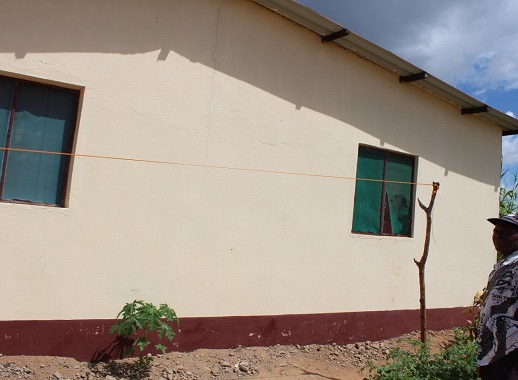
(写真左上=深く掘られた線路。2年前から状況改善されず 右上=土地を失い自宅の脇で作物を作るだけの状況)
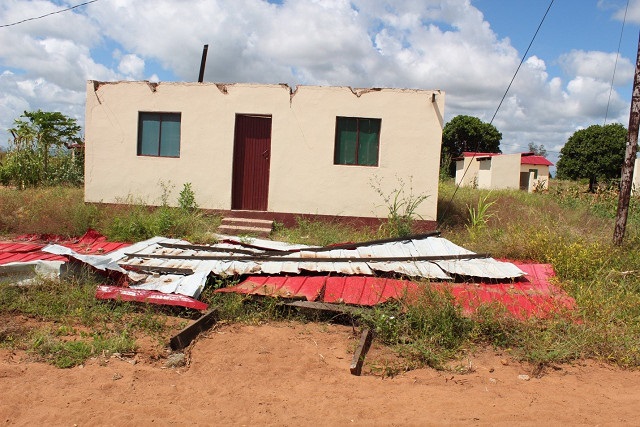
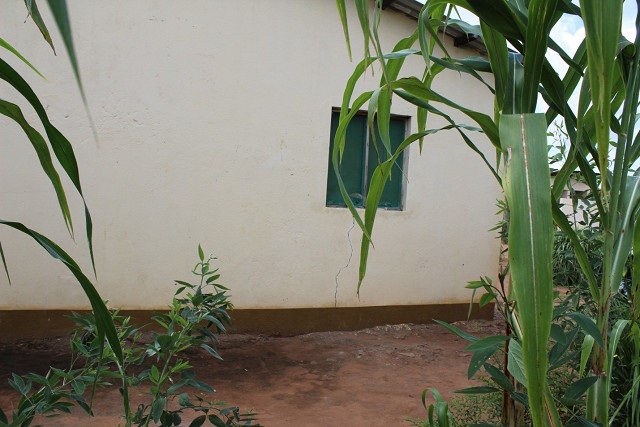
(写真左上=補償で受けとった家屋。すでに壊れた 右上=壁の上のほうにひびが入っている)
以上のとおり、この度の調査からは、2015・2016年度調査時点からの被害が継続、あるいは新たな被害(子どもの通学への影響、住宅補償の問題(質、維持管理、コストなど)、線路横断時の新たな事故、粉塵による作物への影響など)が確認された。
